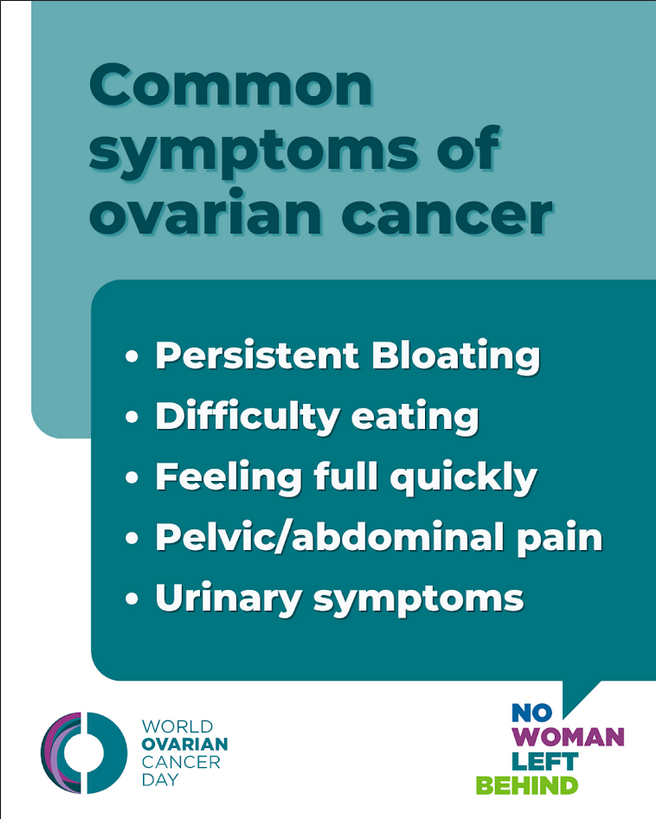“Around the time of menopause, hormonal changes
can impact your mood and emotions.
It’s common to feel low during this time”.1
Umbrella
What may the Menopause Depression umbrella include?
Depending on the Source (DotS) this Umbrella may include:
- Clinical Depression
- Depression
- Depressive Disorder
- Major Depression
- Major Depressive Disorder
- Menopause Blues
Depression
What is depression?
DotS the definition of depression may vary. In Depressive Disorder (Depression): Overview, dated 29 August 2025, the World Health Organization’s definition is:
Depression is different from regular mood changes and feelings about everyday life. It can affect all aspects of life, including relationships with family, friends and community. It can result from or lead to problems at school and at work”.2
In Depression: What Is Depression? last reviewed December 2024, the (United States) National Institute of Mental Health’s (NIMH) definition is:
Sadness or Depression
Is sadness the same as depression?
In Depression In Women: 4 Things To Know the NIMH explain:
Perimenopause
Is there an association between perimenopause and depression?
In Depression In Women: 4 Things To Know – 3. Certain Types of Depression Are Unique To Women the NIMH note:
- “Perimenopausal Depression affects some women during the transition to menopause. Whereas abnormal periods, problems sleeping, mood swings, and hot flashes are common during the menopause transition, more extreme feelings of irritability, anxiety, sadness, or loss of enjoyment may be signs of depression”.5
Menopause
Is there an association between menopause and depression?
In Menopause Depression: Women, Menopause and Depression HER Center Australia elaborate on:
 “Depression in women in their mid-40’s to early 50’s is a significant problem. For women, middle age is the age with a very high risk of both first time depression as well as depression recurrence. Related to this is the tragic statistic that women aged 45-49, have a high completed suicide rate. The impact of menopause is a critical factor in the development of depression in this group, be it for the first time, or a recurrence of previous depression.
“Depression in women in their mid-40’s to early 50’s is a significant problem. For women, middle age is the age with a very high risk of both first time depression as well as depression recurrence. Related to this is the tragic statistic that women aged 45-49, have a high completed suicide rate. The impact of menopause is a critical factor in the development of depression in this group, be it for the first time, or a recurrence of previous depression.
While many women do not experience significant mental ill health during the transition to menopause, an estimated 40% of perimenopausal women present to their primary healthcare physicians with depressive symptoms. Importantly, depressive symptoms experienced in the menopause transition are different and often worse in severity compared to depression in younger and older women”.6
In Menopause and Mental Health: Mental Health Symptoms Related To Menopause, content updated February 2023, the Australasian Menopause Society (AMS) elaborate on:
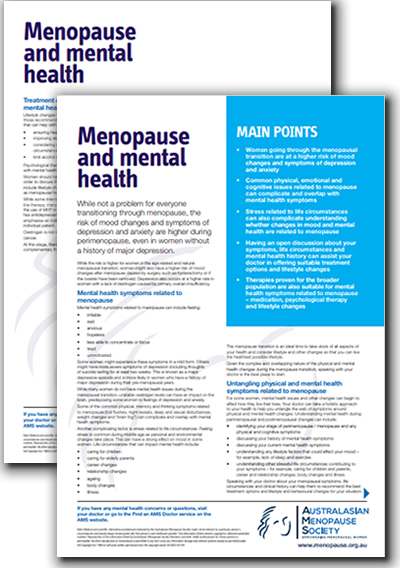 “Mental health symptoms related to menopause can include feeling:
“Mental health symptoms related to menopause can include feeling:
- Irritable
- Sad
- Anxious
- Hopeless
- Less able to concentrate or focus
- Tired
- Unmotivated
Some women might experience these symptoms in a mild form. Others might have more severe symptoms of depression (including thoughts of suicide) lasting for at least two weeks. This is known as a major depressive episode and is more likely in women who have a history of major depression during their pre-menopausal years.
While many women do not have mental health issues during the menopausal transition, unstable oestrogen levels can have an impact on the brain, predisposing some women to feelings of depression and anxiety”.7
Cause
What may cause depression during menopause?
In Managing Your Symptoms: Managing Mental and Emotional Health the (Australian) Jean Hailes for Women’s Health explain:
It’s common to feel low during this time. You might experience symptoms such as stress and anxiety as well as forgetfulness and brain fog.
At this stage of life, other issues can affect your emotions. For example, if you’re juggling many responsibilities and feeling more stress than normal”.8
In Mood and the Menopause, content updated 09 February 2023, the AMS elaborate on:
What is VMS?
VMS can be an abbreviation for Vasomotor Symptoms such as hot flushes and night sweats.
What is MDD?
MDD can be an abbreviation for Major Depressive Disorder.
What is FSH?
FSH can be an abbreviation for Follicle Stimulating Hormone.
Treatment
How may perimenopausal and menopausal depression be treated?
In Menopause and Mental Health: Treatment Options for Mental Health Symptoms the AMS elaborate on:
While some international guidelines do not recommend MHT as first line therapy, many doctors have seen a positive effect on mood with the use of MHT in the first instance. There is evidence that oestrogen has antidepressant effects, particularly in perimenopausal women. We emphasise an individualised approach with treatment tailored to the individual patient.
Oestrogen is not recommended for women with a history of breast cancer.
At this stage, there is no evidence to recommend alternative or complementary therapies for treatment of perimenopausal depression”.10
Hormone Therapy vs Antidepressants
What does Professor Kulkarni explain about hormone therapy or menopausal hormone therapy (MHT) as a treatment option for menopause mental health issues?
In Depression: A Major Challenge of the Menopause Transition – Abstract, published October 2022, Professor Kulkarni, Professor of Psychiatry at The Alfred Hospital, Melbourne; Head of Department of Psychiatry at Monash University, Melbourne; and Director of the Monash Alfred Psychiatry Research Centre, Melbourne, Victoria, explains:
In Menopause Depression: Under Recognised and Poorly Treated – A New Approach for Menopausal Mental Health, published 18 May 2024, Kulkarni, J. et al. also elaborate on:
Health Care Provider
What if I feel depressed?
If you feel depressed, it may be in your best interest to choose to talk to your health care provider abut this, soon as possible.
In Menopause and Mental Health: Untangling Physical and Mental Health Symptoms Related To Menopause the AMS elaborate on:
“Speaking with your doctor about your menopausal symptoms, life circumstances and clinical history can help them to recommend the best treatment options and lifestyle and behavioural changes for your situation”.13
In Menopause and Mind Health the JH remind us:
- You are experiencing strong emotions
- You think you have anxiety or depression
- Menopausal symptoms are impacting your quality of life
- Your brain fog is long lasting or stopping you from doing daily activities”.14
In Menopause Depression: Under Recognised and Poorly Treated – A New Approach for Menopausal Mental Health, Kulkarni, J. et al. note:
Health Topics A-Z
Where may I find Health Topics A-Z related to Menopause Depression?
In Health Topics A-Z you may find:
Links
Where may I find Links related to Menopause Depression?
Your Country may have Links similar to:
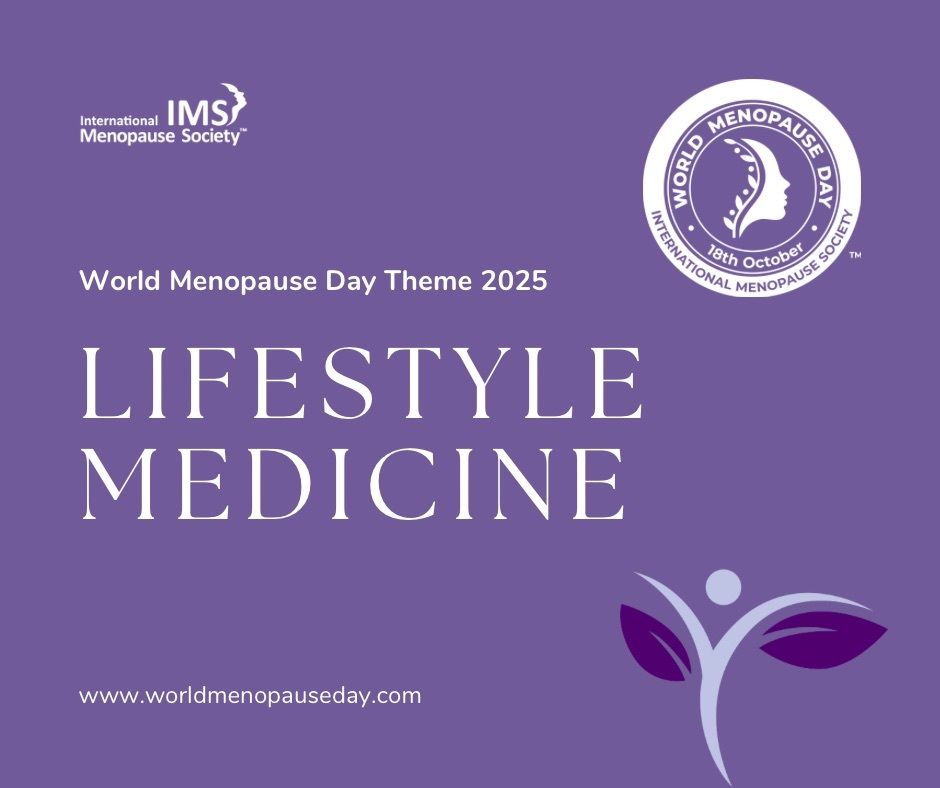
Links
This Links List to third party websites is neither comprehensive nor exhaustive. Inclusion on this Links List does not imply endorsement or recommendation. Non-inclusion on this Links List does not imply non-endorsement or non-recommendation. Third party websites are not under the control of Meno Martha International Menopause Directory. Third party websites may contain explicit medical images and/or sexual references. Please read Meno Martha International Menopause Directory’s Links Policy before proceeding to a Link. Please contact Webmaster if you experience a problem with a Link.New or Updated
- Could It Be Perimenopause? How Hormones Influence the Brain [October 2025]
- Four Ways To Ease Your Mental Load In Midlife [22 October 2025]
- Penny Lancaster: The Truth About Menopause Care [18 November 2025]
- Rethinking Mental Health and Antidepressant Prescribing [15 February 2026]
- The Menopause ‘Mind field’ [May 2025]
- World Menopause Day 2025 [18 October]
- 20 Ways To Relieve Stress
- Anxiety Self-Help Guide
- Anxiety vs. Depression: Which Do I Have (or Is It Both)?
- Askearlymenopause.org [Ask EM] [+ Video: What Is Early Menopause?]
- Can Antidepressants Cause Weight Gain? With Josh Maline, PharmD, BCPP
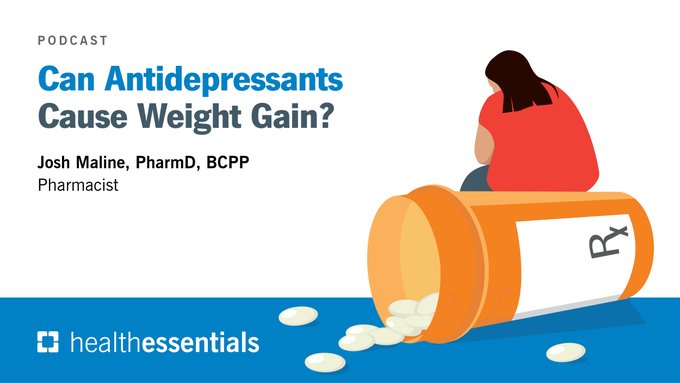
- Cognitive Behaviour Therapy (CBT) for Menopausal Symptoms
- Common Mental Health Diagnoses Arising From or Coinciding With Menopausal Transition and Prescribing of SSRIs/SNRIs Medications and Other Psychotropic Medications
- Consumer Video and Podcast Series: 2024 Consumer Videos and Podcasts – Cognitive Behavioral Therapy and Menopause
- Consumer Video and Podcast Series: 2024 Consumer Videos and Podcasts – Preparing for Your Menopause Healthcare Visit
- Consumer Video and Podcast Series: 2025 Consumer Videos and Podcasts – Nutrition At Menopause and Why It Is Important
- Could It Be Perimenopause? How Hormones Influence the Brain
- Can Menopause Cause Depression? Depression
- Depression
- Depression In Women: 4 Things To Know
- Depression [+ Video Courtesy: Mayo Clinic News Network]
- Depression and the Menopause
- Depression: A Major Challenge of the Menopause Transition
- Do You Know Someone Who May Be Considering Suicide
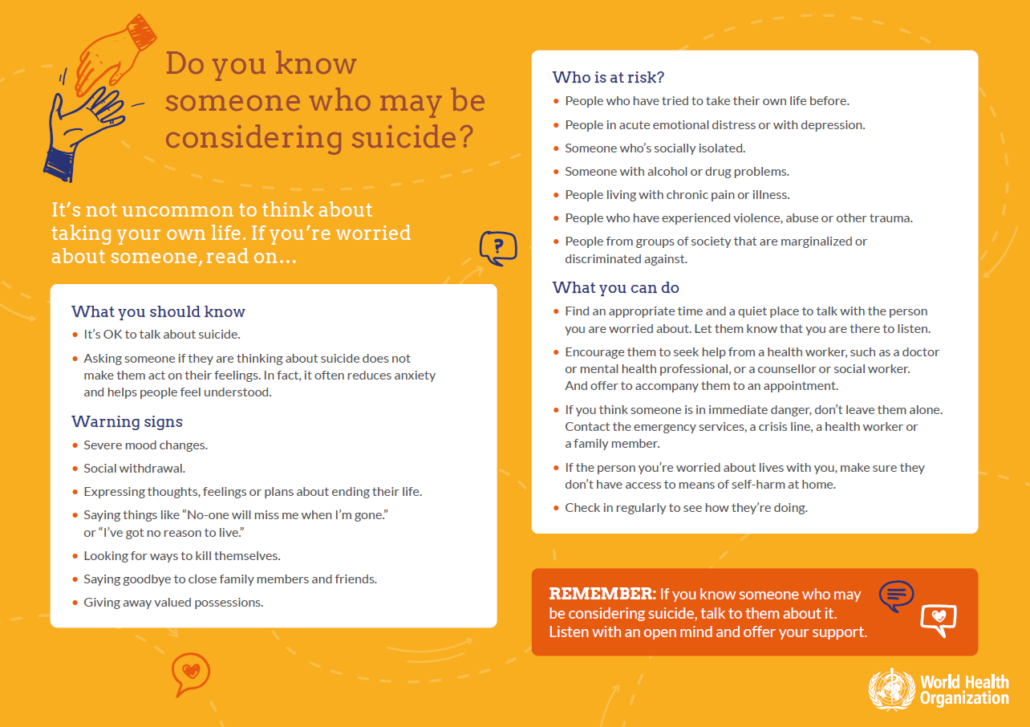
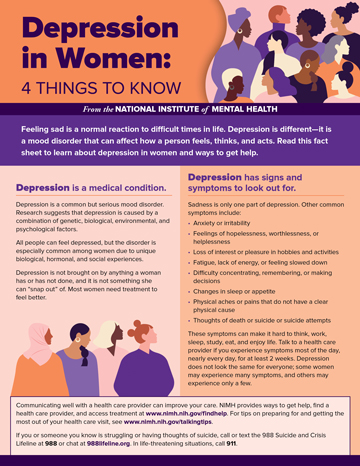 Does Menopause Hormone Therapy Improve Symptoms of Depression? Findings From A Specialized Menopause Clinic
Does Menopause Hormone Therapy Improve Symptoms of Depression? Findings From A Specialized Menopause Clinic- Does Menopause Really Cause Depression?
- Effects of Nutritional Interventions on the Severity of Depressive and Anxiety Symptoms of Women In the Menopausal Transition and Menopause: A Systematic Review, Meta-Analysis, and Meta-Regression
- Emotional Well Being
- Emotional Wellness In Menopause
- Exercising Your Way Out of Depression
- Experts Answer Your Menopause Questions In New Video
- Find A Menopause Practitioner [United States and Other]
- Find A Practitioner [Australasian Menopause Society i.e. Australia and New Zealand]
- Find Your Nearest BMS Menopause Specialist [British Menopause Society]
- Finding A Mental Health Professional
- Four Ways To Ease Your Mental Load In Midlife
- Getting Help [United Kingdom]
- HRT Questions Answered
- Headtohealth.gov.au: Head To Health [Australia]
- HER Centre Australia
- Hormones & Mental Health: What Every Woman Needs To Know | Live With Dr Louise Newson
- How To Manage Menopausal Insomnia
- How To Talk To Your Doctor About Menopause
- How To Talk To Your Doctor About Midlife Brain Fog
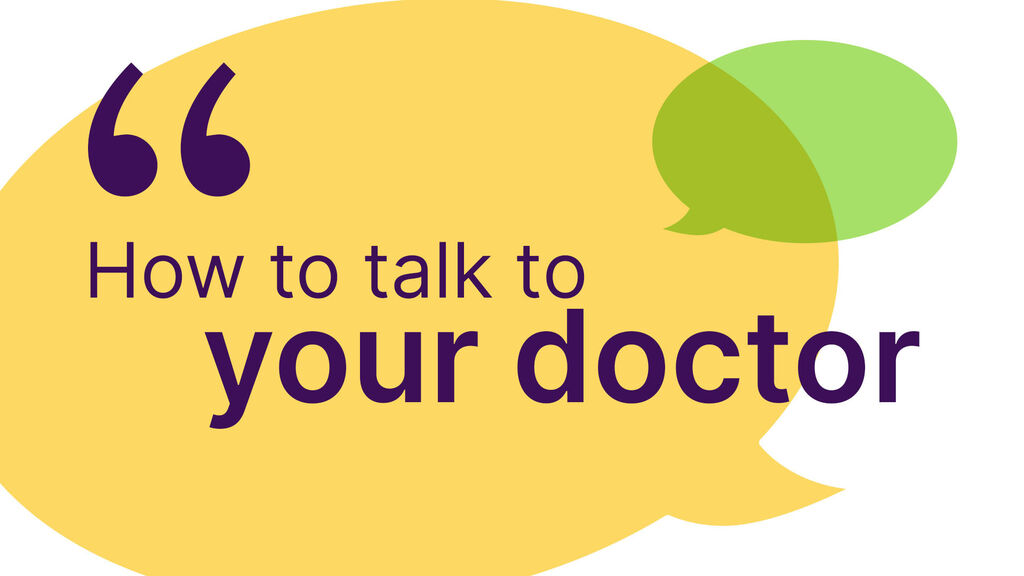
- IMS Interview Series for Women: Lifestyle Medicine With Prof. Rossella Nappi | For Women
- Is Hormone Therapy A Key Strategy In Treating Menopausal Depression? [Video]
- Jayashri Kulkarni: Our Hormones and Our Minds [Podcast]
- Later Years (Around 50 Years and Over): Menopause and Post Menopause Health – Menopause and Your Mental Wellbeing [+ Video: Menopause Only Affects You Physically!] [Other Languages and Formats]
- Later Years (Around 50 Years and Over): Menopause and Post Menopause Health – Supporting Someone Through the Menopause [+ Video: Men Don’t Need To Know About Menopause] [Other Languages and Formats]
- Let’s Talk About Perimenopause
- Mastering Midlife Mood Changes With Marlene Freeman, MD
- Mayo Clinic Q&A: Seasonal Affective Disorder Is More Than Feeling Sad
- Menopause
- Menopause Depression
- Menopause Depression Risk Has Been Exaggerated
- Menopause Depression: Under Recognized and Poorly Treated [Kulkarni, J. et al]
- Menopause Depression: Under Recognized and Poorly Treated [By Professor Jayashri Kulkarni and Dr Louise Newson, on behalf of all authors on article]
- Menopause Map: Downloadable Resources – My Personal Path Print Tools: Questions for Your Health Care Provider

- Menopause Map: Downloadable Resources – My Personal Path Print Tools: Symptom Tracker
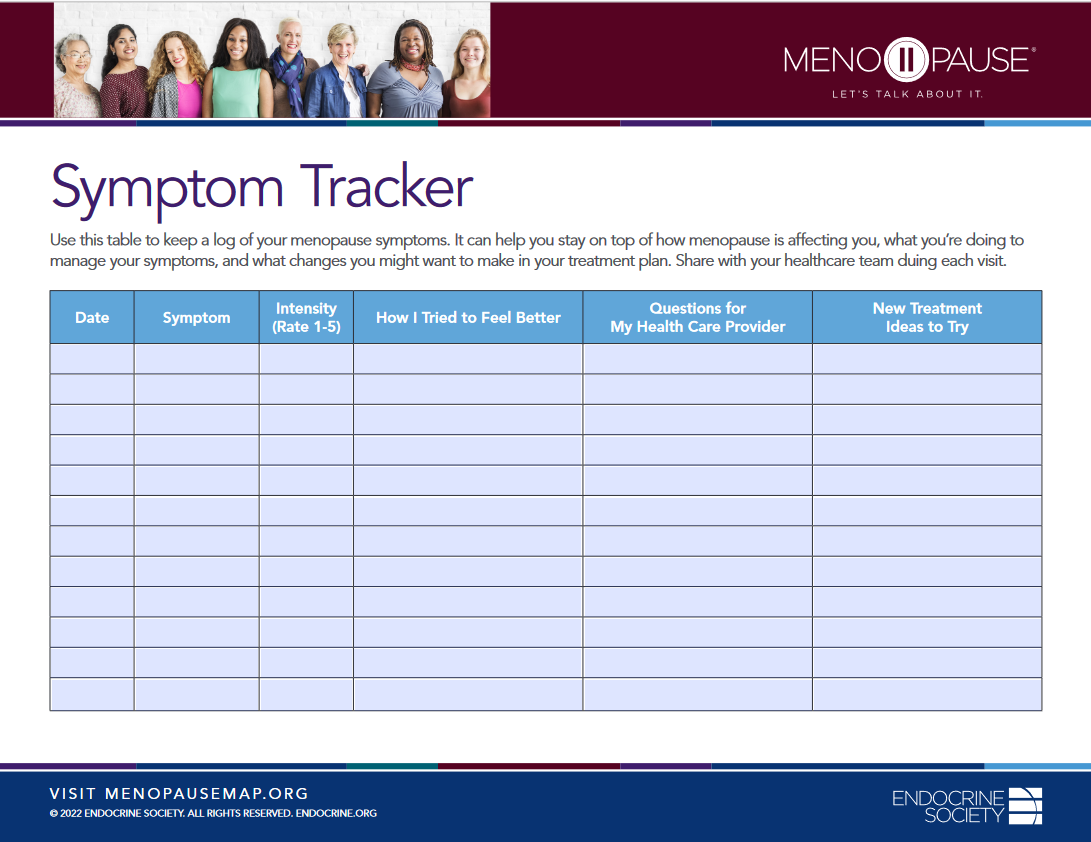
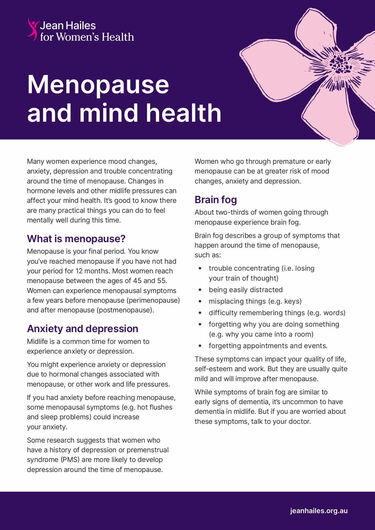 Menopause Transition Does Not Increase Risk for Depressive Symptoms for All Women
Menopause Transition Does Not Increase Risk for Depressive Symptoms for All Women- Menopause and Mental Health
- Menopause and Mental Health
- Menopause and Mental Health
- Menopause and Mind Health Fact Sheet
- Menopause: Identification and Management [NICE Guideline]
- Menopause: Identification and Management [NICE Guideline]

- Menopause: Things You Can Do
- Mental Health: Mental Health Self Help Guides
- Mood Changes During Perimenopause Are Real. Here’s What to Know.
- Mood and the Menopause
- Mymenoplan.org [My Menoplan, United States]
- National Center for Complementary and Integrative Health: Depression
- National Center for Complementary and Integrative Health: Herbs At A Glance
- National Center for Complementary and Integrative Health: How Safe Is This Product or Practice?
- National Women’s Health Week [11-17 May 2025]: Navigating the Road To Menopause
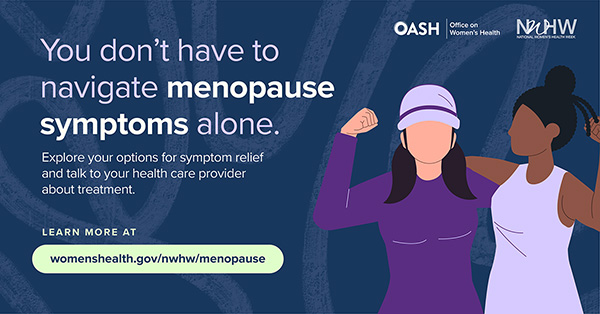
- Navigating Menopause: Could Better Support Reduce Depression Risk?
- Navigating Menopause: Honest Answers To All Your Questions [+ Video: What To Expect In Menopause]
- Navigating Menopause Care Resource Guide
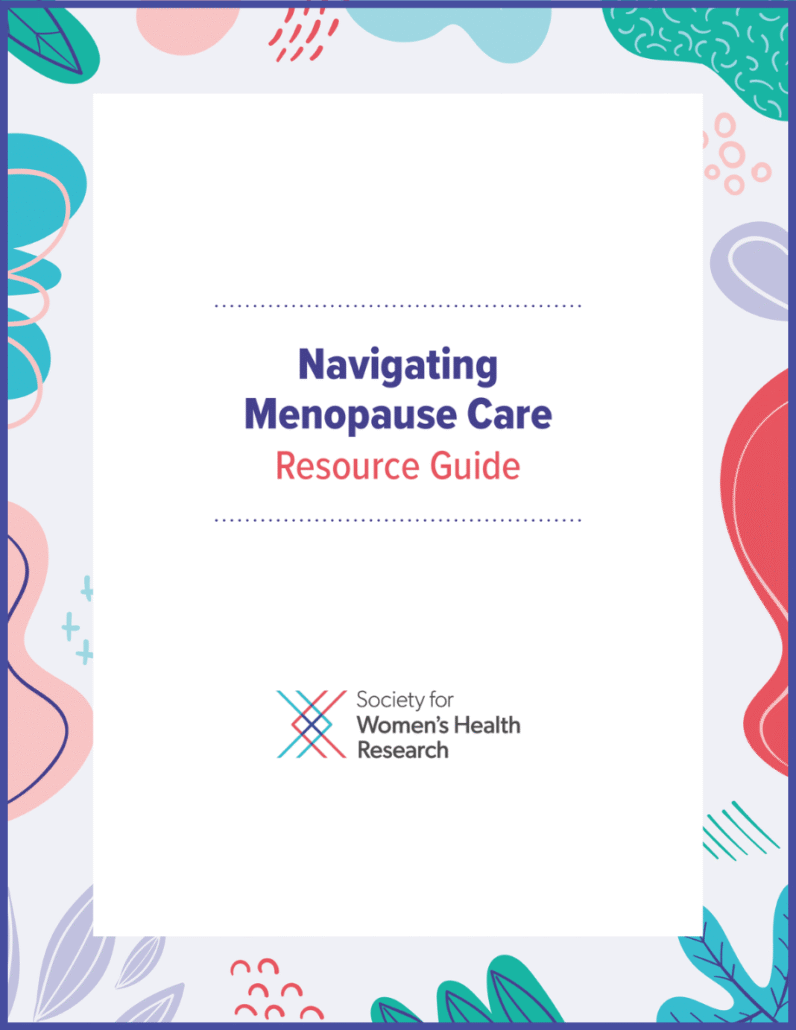
- “Not feeling like myself” in perimenopause — what does it mean? Observations From the Women Living Better Survey
- Online Events [International Menopause Society]: Past Webinars – 2025: Lifestyle Medicine
- Penny Lancaster: The Truth About Menopause Care
- Perimenopause
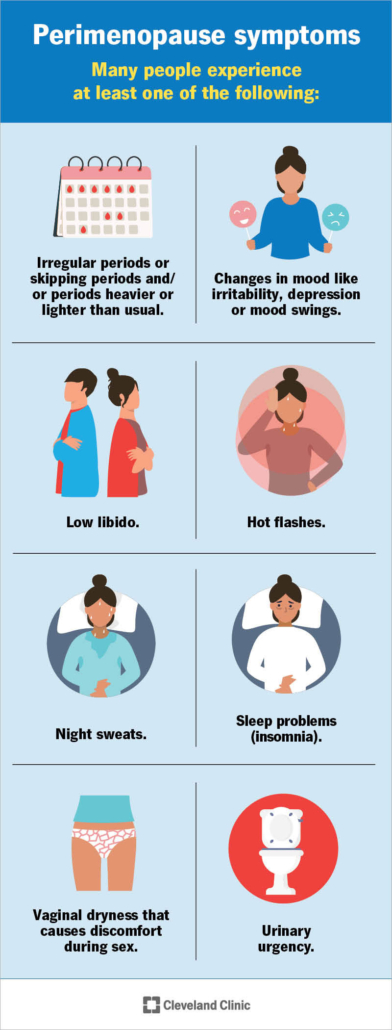
- Perimenopause
- Perimenopause and Depression
- Perimenopause and Menopause Checklist: Translated Checklists
- Perimenopause and Menopause Symptom Checklist

- Perimenopause and Menopause Toolkit
- Promoting Good Mental Health Over the Menopause Transition
- Resources: Fact Sheets [Multiply Languages]

- Resources: Infographics

- Self-Help Tool: Menopause and Mental Wellbeing
- Severe Mental Illness and the Perimenopause
- Talking About Hormonal Change | Dr Louise Newson LIVE
- The Menopause ‘Mind field’
- The Menopause Society Statement on Misinformation Surrounding Hormone Therapy
- The Risk of Depression In the Menopausal Stages: A Systematic Review and Meta-Analysis
- Therapy Could Be Effective Treatment for Non-Physical Symptoms of Menopause
- Top Tips To Improve Your Mental Wellbeing
- Transdermal Oestradiol and Testosterone Therapy for Menopausal Depression and Mood Symptoms: Retrospective Cohort Study
- Using Network Analysis To Understand the Association Between Menopause and Depressive Symptoms
- Videos & Podcasts: Videos – Menopause and Hormone Therapy: Current Perspectives and Controversies
- Webinars: Lifestyle Medicine
- What Is Cognitive Behavioral Therapy?
- When Does Perimenopause Start and How Do You Define the Beginning
- Women and Mental Health
- World Menopause Day 2025

Sources
Where may I find the Sources quoted?
You may find the Sources quoted at:
Sources
- How To Manage Menopausal Symptoms: Managing Mental and Emotional Health – Anxiety and Depression. Last Updated: 19 May 2025 | Last Reviewed: 22 April 2025. Jean Hailes for Women’s Health https://www.jeanhailes.org.au/health-a-z/menopause/managing-your-symptoms#managing-mood-and-emotional-health Accessed: 02 November 2025
- Depressive Disorder (Depression): Overview. 29 August 2025. World Health Organization https://www.who.int/news-room/fact-sheets/detail/depression Accessed: 02 November 2025
- Depression: What Is Depression? Last Reviewed: December 2024. National Institute of Mental Health https://www.nimh.nih.gov/health/topics/depression/index.shtml#part_145398 Accessed: 02 November 2025
- Depression In Women: 4 Things To Know. Revised: 2023. National Institute of Mental Health https://www.nimh.nih.gov/health/publications/depression-in-women Accessed: 02 November 2025
- Depression In Women: 4 Things To Know – 3. Certain Types of Depression Are Unique To Women. Revised: 2023. National Institute of Mental Health https://www.nimh.nih.gov/health/publications/depression-in-women Accessed: 02 November 2025
- Menopause Depression: Women, Menopause and Depression. HER Center Australia https://www.monash.edu/medicine/her-centre/education/resources/menopause-depression Accessed: 02 November 2025
- Menopause and Mental Health: Mental Health Symptoms Related To Menopause. Content Updated: February 2023. Australasian Menopause Society https://www.menopause.org.au/health-info/fact-sheets/menopause-and-mental-health Accessed: 02 November 2025
- How To Manage Menopausal Symptoms: Managing Mental and Emotional Health. Last Updated: 19 May 2025 | Last Reviewed: 22 April 2025. Jean Hailes for Women’s Health https://www.jeanhailes.org.au/health-a-z/menopause/managing-your-symptoms#managing-mood-and-emotional-health Accessed: 02 November 2025
- Mood and the Menopause. Content Updated: 09 February 2023. Australasian Menopause Society https://www.menopause.org.au/hp/information-sheets/mood-and-the-menopause Accessed: 02 November 2025
- Menopause and Mental Health: Treatment Options for Mental Health Symptoms. Content Updated February 2023. Australasian Menopause Society https://www.menopause.org.au/health-info/fact-sheets/menopause-and-mental-health Accessed: 02 November 2025
- Kulkarni, J. et al. Depression: A Major Challenge of the Menopause Transition – Abstract. October 2022 https://medicinetoday.com.au/mt/2022/october/feature-article/depression-major-challenge-menopause-transition Accessed: 02 November 2025
- Kulkarni, J. et al. Menopause Depression: Under Recognised and Poorly Treated – A New Approach for Menopausal Mental Health. 18 May 2024 https://journals.sagepub.com/doi/10.1177/00048674241253944 Accessed: 02 November 2025
- Menopause and Mental Health: Untangling Physical and Mental Health Symptoms Related To Menopause. Content Updated: February 2023. Australasian Menopause Society https://www.menopause.org.au/health-info/fact-sheets/menopause-and-mental-health Accessed: 02 November 2025
- Menopause and Mind Health Fact Sheet: When To See Your Doctor. Updated: May 2023. Jean Hailes for Women’s Health https://www.jeanhailes.org.au/resources/menopause-and-mind-health Accessed: 02 November 2025
- Kulkarni, J. et al. Menopause Depression: Under Recognised and Poorly Treated – A New Approach for Menopausal Mental Health. 18 May 2024 https://journals.sagepub.com/doi/10.1177/00048674241253944 Accessed: 02 November 2025





